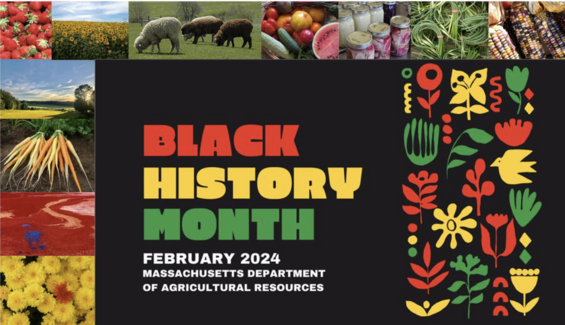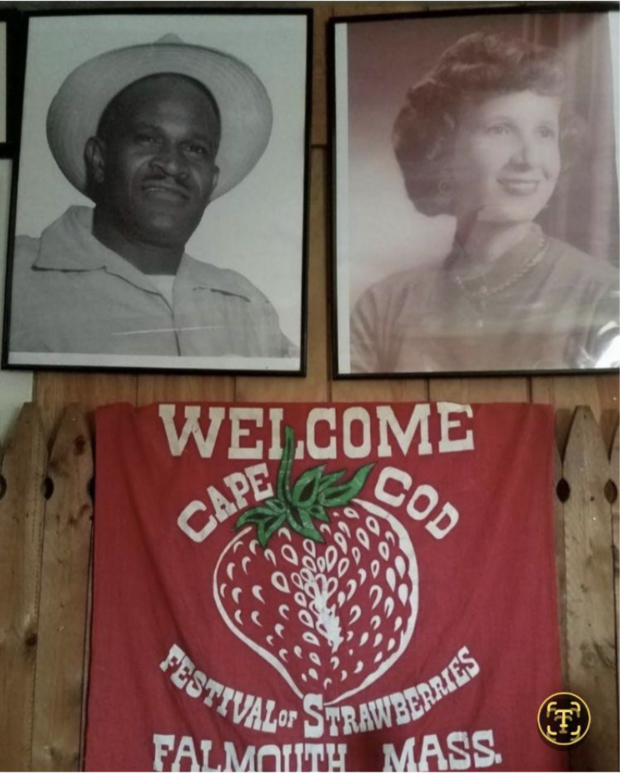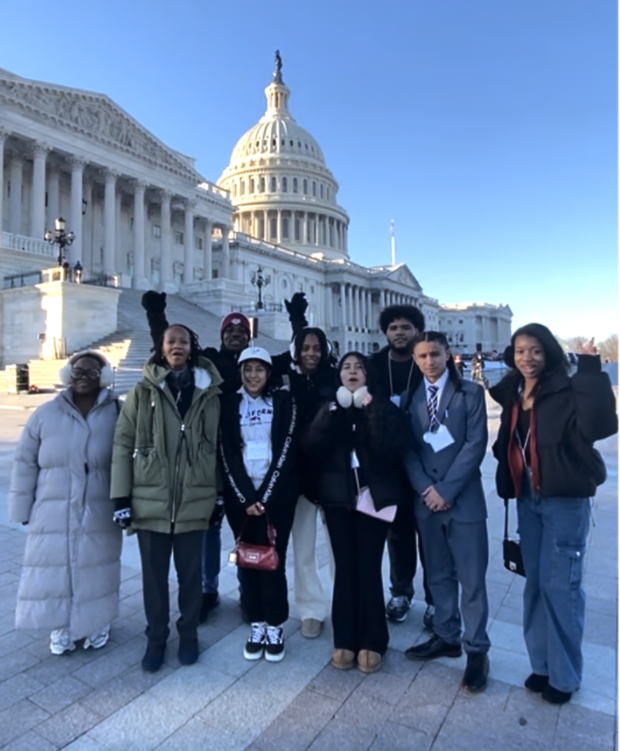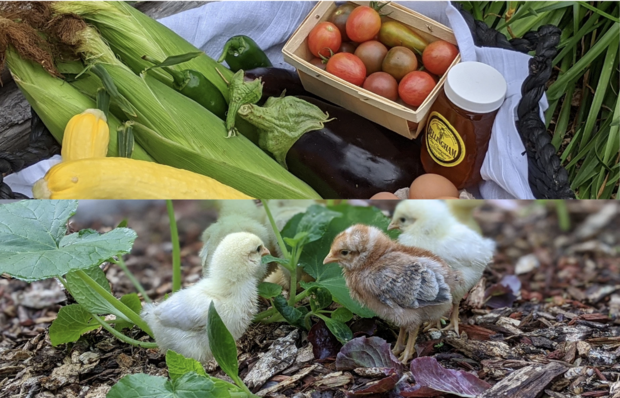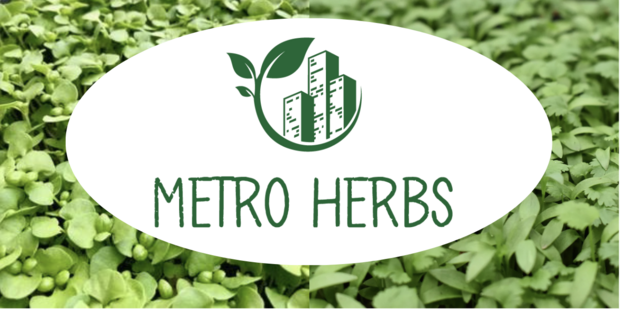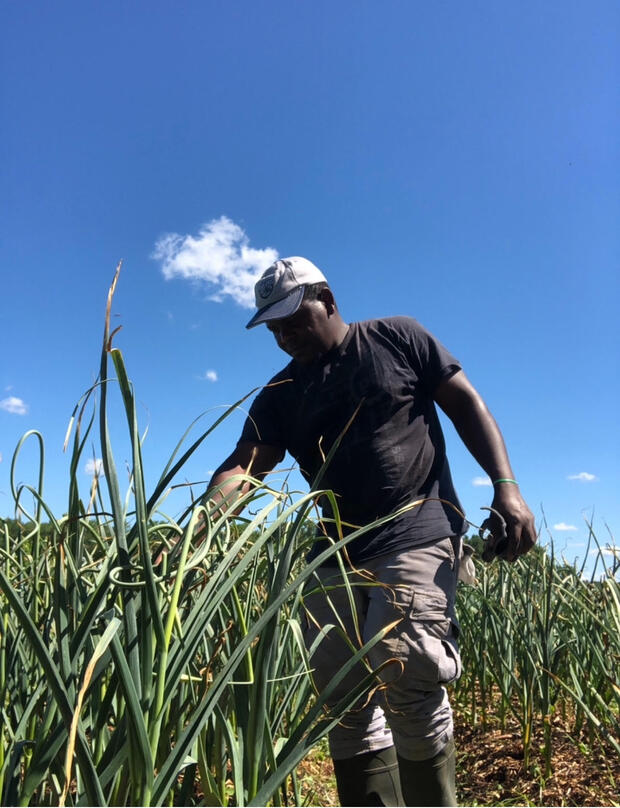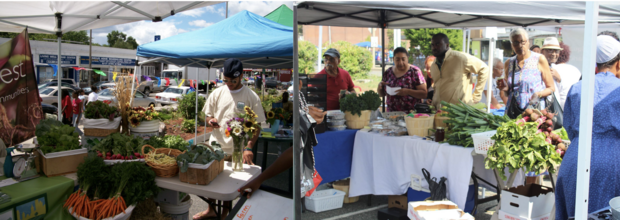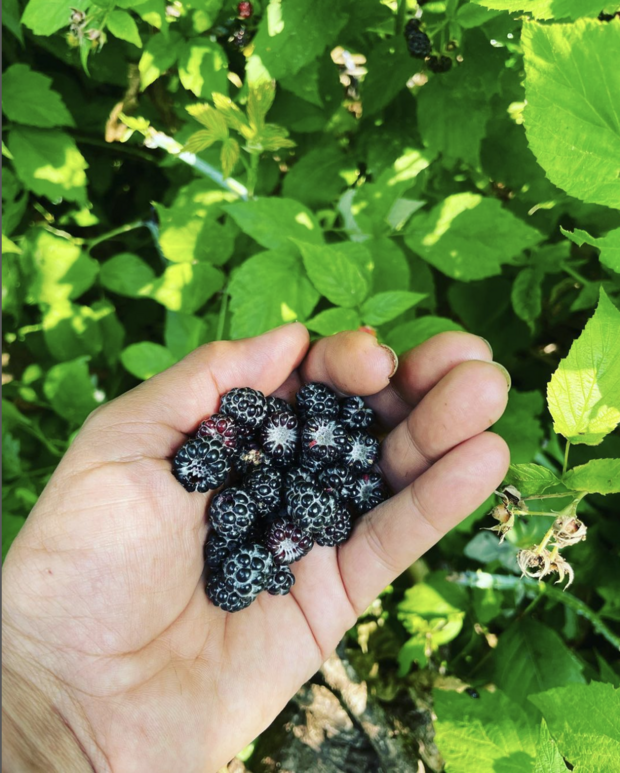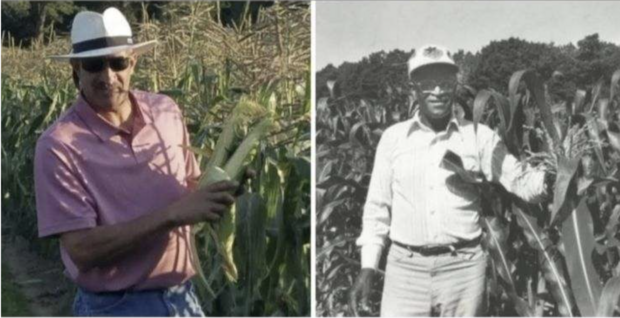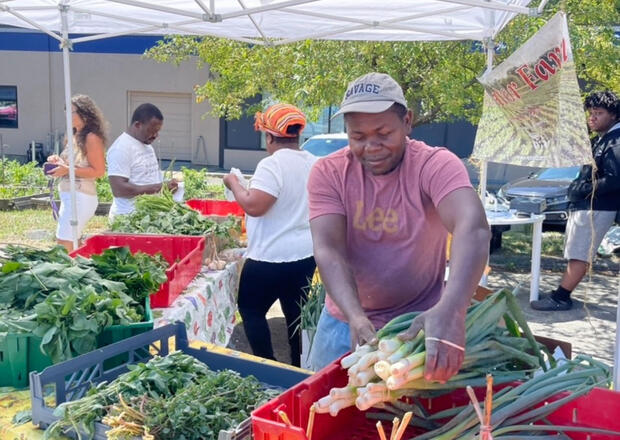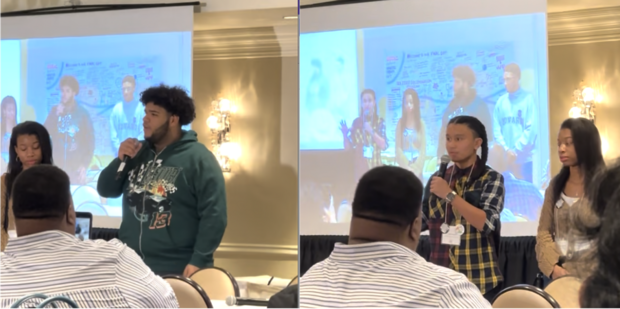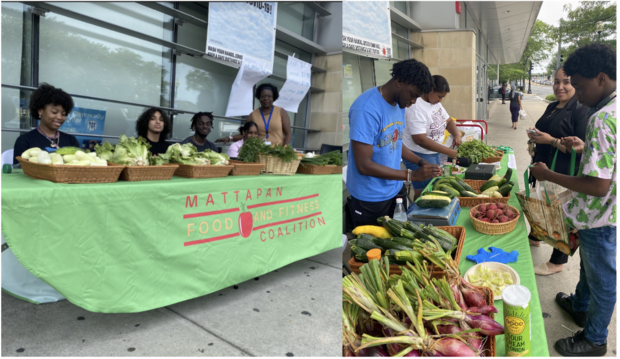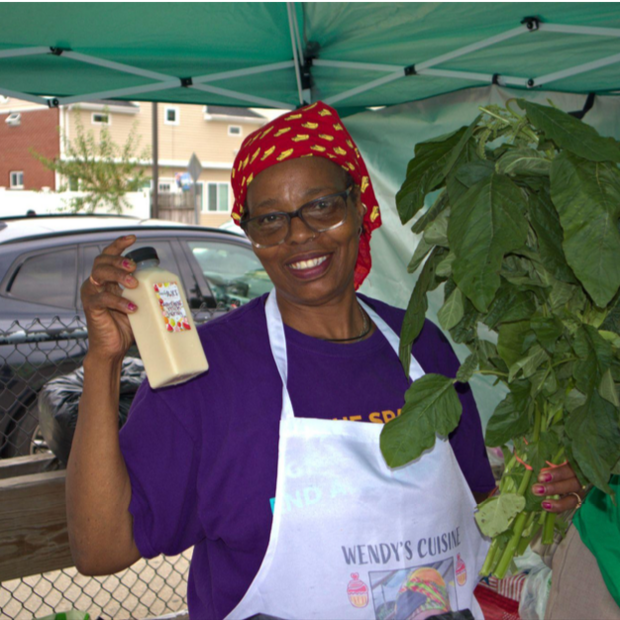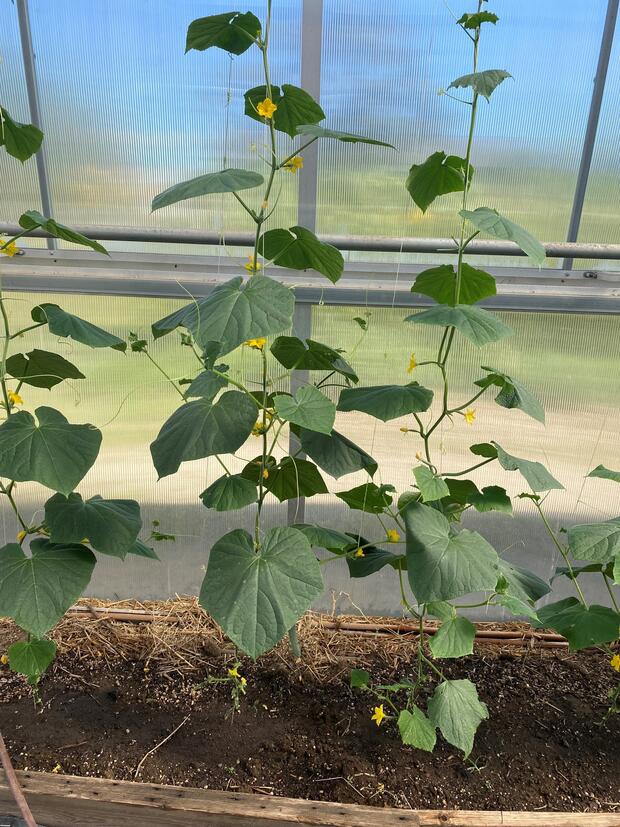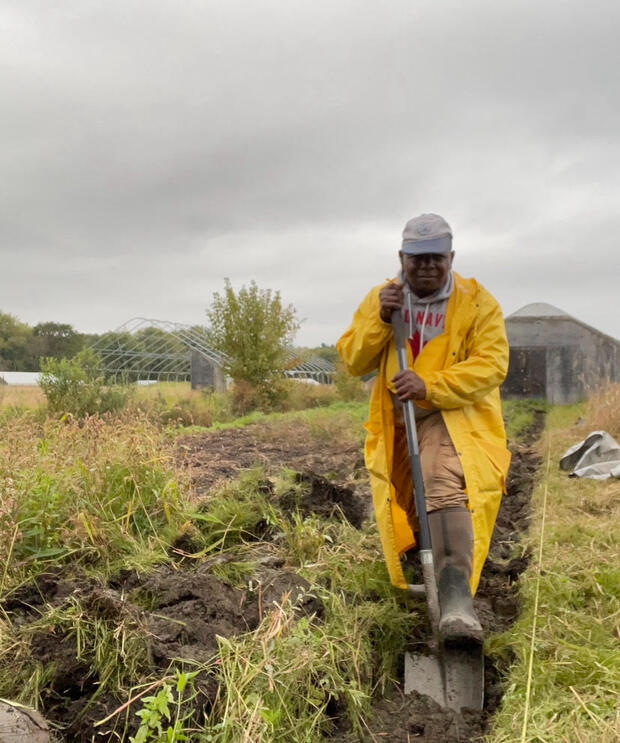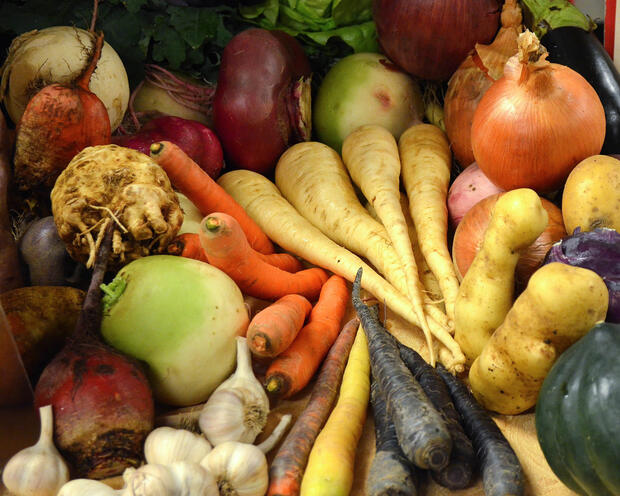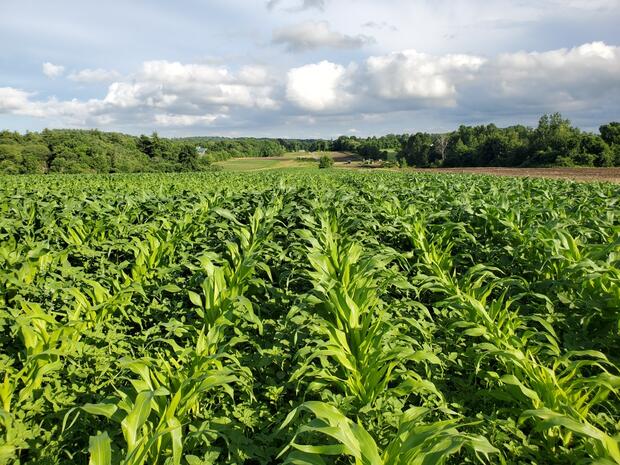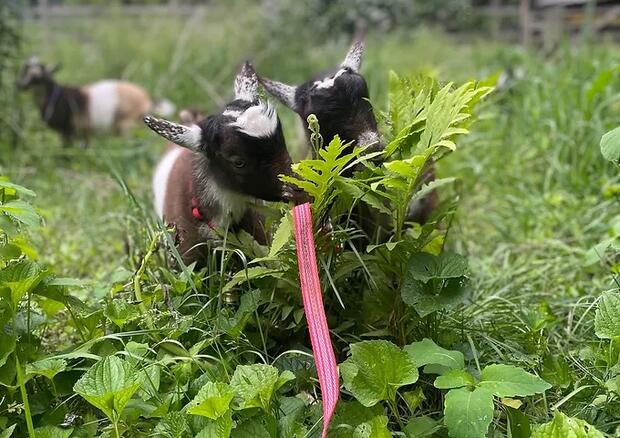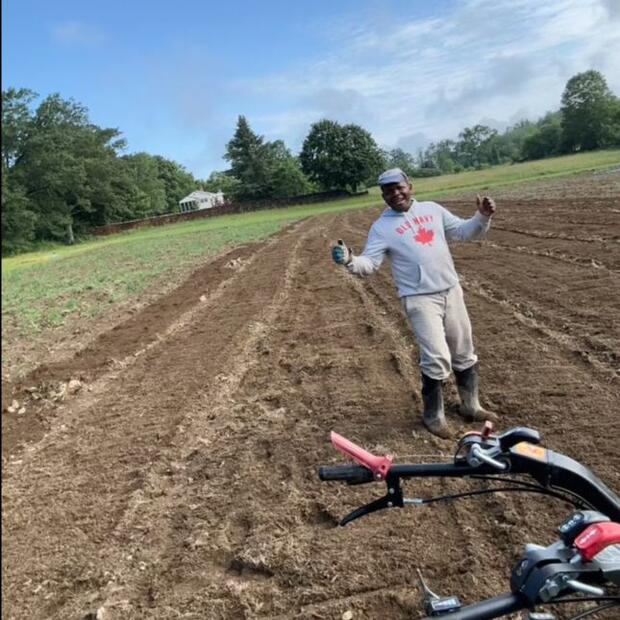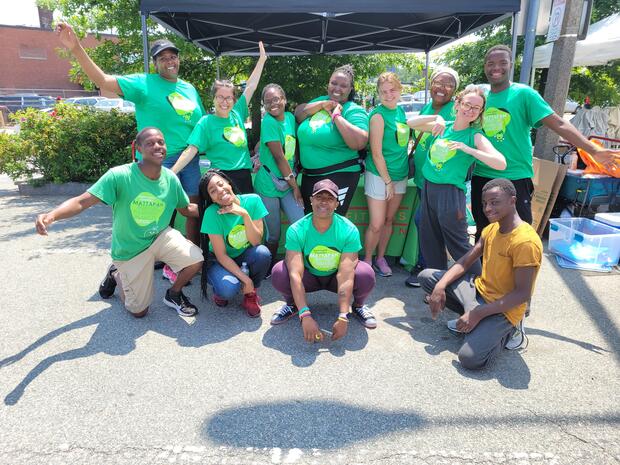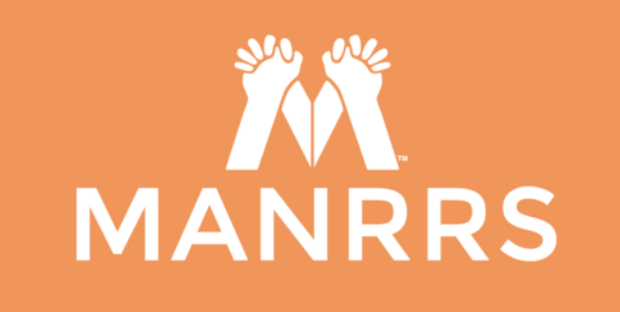Meet Black Farmers and Black-Led Organizations in Massachusetts!
In celebrating Black History Month, the EJ team interviewed and heard stories from Black farmers and allied organizations across the Commonwealth. Farmers graciously shared their, at times painful, journeys to where they are today. The EJ team asked farmers to share their stories, and in the spirit of looking towards the future, we wanted to hear advice farmers would share with Black youth looking to enter into a career in the Massachusetts food system.
MDAR's EJ team wants to emphasize the importance of, and our commitment to, uplifting Black farmers, not just during this important month, but in all of our efforts.
Tell us about your journey to where you are today:
Geoff Andrews, of Tony Andrews Farm, shared the rich history behind his farm. Geoff’s father, Tony Andrews, had an entrepreneurial spirit, first coming to Massachusetts in 1926, in his work to shuttle goods from Cape Verde to Cape Cod. After joining his uncle living in Rhode Island, he began his agricultural journey working on the cranberry bogs of Massachusetts. Tony was a visionary and started to buy property in Falmouth with his uncle. This land became Tony Andrews Farm.
Photo provided by Tony Andrews Farm
This was when Tony became the “Strawberry King," With 45 acres of strawberries, Tony Andrews Farm had 30-40 laborers picking strawberries daily. Between June and July, Tony would deliver his strawberries to Chelsea Market in Boston, where he was met with racial discrimination. Tony received lower prices for his product, and sometimes turned away entirely, being told they “Had enough berries”, and even when he was the first grower to arrive. At the time, Tony was one of just two Black farmers bringing berries to Boston.
Tony leveraged the pain of this racism and transitioned his farm to a successful “pick your own”business. Geoff, who spent much of his time with his mother and father learning of the operation, eventually took over Tony Andrews Farm, which continues to be a cornerstone food access point for the community.
Liz O’Gilvie, of the Springfield Food Policy Council and Gardening the Community, shared her story of entering the food system through Gardening the Community, a food justice organization engaged in youth development, urban agriculture, and sustainable living. Originally from Springfield, Massachusetts, Liz spent time away in other states, including teaching at the University of Chicago. The election of the nation’s first Black President, especially given that Liz had a working relationship with Barack and Michelle Obama, inspired Liz to return to Springfield in 2008, and make a difference in her community.
Photo provided by Gardening the Community
Liz’s inspiration to join the emerging board of Gardening the Community began with a knock on the door. Liz recalls a group of teenagers asking her “where do you buy your food? Do you know we are starting to grow food? You can come to our farm site ”. At that time GTC was still a project at NOFA, the Northeast Organic Farming Association, inspired by the leadership of then Co-Directors, Ibrahim Ali and Anne Richmond and the shared understanding of Black land theft the GTC Advisory Board made the decision to purchase the land that would become the 200 Walnut Street. Gardening the Community permanent farm site and farm store.
Gardening the Community sparked a real passion within Liz to teach kids how to grow food and to work to make the food system racially equitable and just and ensure that communities have food sovereignty by educating others about Black land loss, emphasizing the critical link between land and food access.
Justine Corchado, of Shitefoot Farm and Jaebird Farm, shared her family’s history in the food system from their journey from Cape Verde to her recently discovered family past tracing back to a farm in Bridgewater. Growing up in Chelsea, Justine was keenly aware of the limited access to green space and fresh food, a legacy of the systemic inequities in Boston’s history of development. Despite the limited access to green space and fresh food, Justine clung to her interest and family history in growing, by collecting and saving seeds she found.
Photo provided by Jaebird Farm
Since then, Justine grown her farm from a 4’x4’ bed with three containers in Roxbury to multiple properties in Bellingham. She recalls the joy and amazement at growing her first strawberries, sharing that “they were the best strawberries I ever tasted - not because I was an amazing grower, but because they were fresh and pesticide-free.” As their farm grew, they began to donate the extra fruit, vegetables, and eggs. The disparity between the fresh food in Chelsea in Bellingham drove Justine’s desire to “bring food to people, where people don’t have it." “I’m a bad businessperson” says Justine, “because I see food as a basic right - everyone should be able to have it.” Shitefoot Farm sells their fruits and vegetables to Eastie Farm in East Boston, and Justine hopes to continue to grow their production and bring fresh local produce to areas with limited access.
Justine is proud of her farm and their contributions to the food system but noted that she can be hesitant to invite and engage government agencies due to past historical discrimination and barriers. Farmers of Color have worked hard to secure land, and regulators must work to re-build trust after a long history of racism and discriminatory practices.
Matthew S., of Metro Herbs, shared his goals in operating an urban microgreens indoor farm in Dorchester. As both the founder and farmer, Matthew envisions “bringing substantial change to both representation and sustainable farming practices. Metro Herbs actively embodies this change, not only cultivating hyper-fresh local produce but also ensuring affordability. This deliberate approach will significantly impact the community's access to nutritious food options.”
Photo provided by Metro Herbs.
In addition to farming, Metro Herbs extends its influence by providing education and consulting services, which aim to empower both individuals and communities grappling with limited space and resources. Matthew aspires to serve as a beacon of positive transformation and his urban farm “vividly showcases the potential of microgreens cultivation in advancing sustainable farming practices. The commitment of Metro Herbs to offering accessible and nutritious options highlights the role a small indoor vertical farm can play in sparking social impact and change across the broader agricultural landscape.”
Barnabas Forndia, of Juahkumbah Farm, grew up in Liberia’s rural Bomi Hills, where farming was both a means of livelihood and a way of life that was deeply ingrained in the fabric of his community.
Photo provided by Juahkumbah Farm
Upon immigrating to the United States through the Diversity Immigrant Visa program, he encountered the stark reality of “starting over” in a foreign country. Initially, Barnabas’ aspirations for farming were overshadowed by the need to secure employment, but he remained steadfast in his passion for agriculture, utilizing every available space, including his backyard, to cultivate crops.
In 2017, Barnabas learned of the Flats Mentor Farm program in Lancaster, MA, and began cultivating land through World Farmers. Through dedication and hard work, he was able to transform his initial backyard gardening into a thriving agricultural enterprise and gradually diversified his crops to include traditional Liberian varieties.
Mattapan Food and Fitness Coalition (MFFC) is a health and wellness community-based organization located in Mattapan, a neighborhood in Boston, MA.
Photos provided by Mattapan Food and Fitness Coalition
Their organization was formed to invite the community to work on decreasing chronic health diseases in holistic ways. Through their values of equity and antiracism, health and wellness, community ownership and empowerment, relationship building grounded in trust, respect, and youth power, they aim to continue promoting health and healthy behaviors by improving the nutritional and physical activity environments in Mattapan and surrounding communities.
What advice or knowledge would you share with Black youth thinking about starting a career in the Massachusetts food system?
Justine Corchado, of Shitefoot Farm and Jaebird Farm, urges Black youth to not be dissuaded.
Photo provided by Jaebird Farm
She says “reach out to a BIPOC grower or farmer. We are out here. We may not be as large or with unbroken legacies, but we grow food and raise animals. We would love to answer questions or have a visit, and I’m sure so would others. We need you in the agricultural community. Part of my love of farming is there is always something new to learn and share.”
As a path forward, Justine looks forward to expanding her knowledge of running a farm business but urges course organizers to hire Black educators and teachers to bring new perspectives forward and mentor the next generation of farmers.
Geoff Andrews, of Tony Andrews Farm, recounted how it was important to his father Tony to help other growers, mainly Portuguese Azorean aspiring farmers, to begin their farming journey. Geoff continues to hold this sentiment and would pass onto Black Youth looking to join the agricultural sector, this knowledge: “Don’t be afraid and be firm. Know what you are talking about and know the business before you get into it. Stick up for yourself. Stand by the quality of your product and stay firm based on what you know the market value to be."
Photos provided by Tony Andrews Farm
Geoff and Tony’s stories speak to importance of farmers setting prices of production and highlight an important step in being an ally to Black farmers; always respect the prices set by the farmer. Pricing reflects a farmers’ hard work, dedication to providing local food for their community, and experience in farming.
Matthew S., of Metro Herbs, would like Black youth to know that the farming journey requires commitment. “Farming isn’t easy, urban or otherwise, but the fulfillment it brings is unparalleled. Look beyond just growing and providing food and put more emphasis on innovative processes that benefit others. Share your knowledge, and let collective wisdom elevate agriculture as a as a whole.”
Barnabas Forndia, of Juahkumbah Farm, shared that he would offer the following advice, gleaned from his own experiences, to Black youth contemplating a career in the MA food system: “Embrace perseverance and resilience as essential virtues on the entrepreneurial journey, recognizing that setbacks are inevitable but surmountable.”
He urges youth to seek out mentorship, educational opportunities, and community connections in order to acquire the knowledge and support necessary in navigating the complexities of agriculture. He also highlights the importance of advocating for systemic change and equitable access within the food system and urges youth to leverage collective voices to address barriers and foster inclusivity.
Photo provided by Juahkumbah Farm
Barnabas highlights his own journey as a Black farmer in Massachusetts as a testament to the transformative power of perseverance, community, and passion for agriculture. By sharing his story and insights, he hopes to inspire and empower future generations of Black farmers to pursue their dreams while advocating for a more inclusive and equitable food system for all.
Liz O’Gilvie, of the Springfield Food Policy Council and Gardening the Community, expressed that she wants Black youth to be “proud of our agricultural history, even if we were enslaved for part of it. I want all people to understand how much of the food we eat originated from Africa, and we learned how to grow it from people from Africa.”
Photos provided by Gardening the Community
Liz hears many farmers call for technical assistance, and also stresses the importance of land access. While organizations like World Farmers have made great strides in working with USDA to increase land acquisition, there are still many barriers that Black farmers face in acquiring land. She highlights that even good intentioned grants and programs may still have inequalities
that we need to be aware of to ensure equitable access for farmers. She closes with an important reminder; equity involved moving the timeline, being more flexible, and meeting people where they are at.
Mattapan Food and Fitness Coalition (MFFC)'s Youth Development and Program Manager, Shawntell Usher-Thames, wants youth to know that food is freedom.
“I have seen what having access to fresh grown food can do for a family when they are able to get it free or at an affordable price. Joining organizations or being employed in organizations where you are experiencing what it is like to garden, farm, run your own farm stand and helping farmers sell produce at a local farmers market will explore your interest."
Photos provided by Mattapan Food and Fitness Coalition
MFFC’s own Vigorous Youth have been more appreciative and keen on food access jobs because they are working closely with farmers that grow, harvest their produce, and sell it. Sometimes the youth are able to get a bag filled with the produce from the farmer they helped. At first they were hesitant to take the items given to them. They did not want to look “uncool” carrying bags of vegetables home via bus or walking. After a while they realized how happy it made their family and their food at home tasted better! By the end of the summer they were buying from farmers with their own money. They would come back with stories of helping their families cook or doing it themselves.
Youth being a part of knowing where their food comes from and being able to grow their own food is invaluable.
In concluding our conversations, we asked farmers to reflect on the ways they have built community with other Black farmers or organizations, and what tools would be necessary if they were looking to begin to build that network:
Mattapan Food and Fitness Coalition (MFFC) is a collaborative organization that was informed by the needs of our residents who wanted more and access to affordable and healthy food. To address their needs, the first initiative of the organization is the Mattapan Square Farmers Market. The Black farmers they help to support come from places such as Dominica and Africa. Support looks like providing a space for them to sell their produce, herbs, grains, honey, and more, purchasing equipment needed to set up their vendor station, providing them with volunteers to support with translation and customer service, and recognizing them through their end of season get-togethers.
Photos provided by Mattapan Food and Fitness Coalition
With the support of the City of Boston, our partners, and most importantly the volunteers and community members, they were able to serve 6,200 residents and give back more than $80,000 to our farmers for the past two years.
The invaluable tool that would be needed to create connections and build networks is to connect with your local farmers market. If you are not sure where your local farmers market is located, check in with your town’s local municipality to obtain a list. Inquire about selling at the location and build relationships.
Liz O’Gilvie, of the Springfield Food Policy Council and Gardening the Community, has made great triumphs in building connections with Black farmers across both the Commonwealth and New England. Liz mentioned earlier in the interview her connections to various community-organizations, like NOFA, MAPC, and the Springfield Food Policy Council.
Photo provided by Gardening the Community
As Liz started to dive more into policy, she began working more with the Springfield Food Policy Council and became involved in bringing a lens of food sovereignty, food access, and land access everywhere she went. From community meetings to statewide planning meetings, Liz spoke up and advocated for change needed in the systems that perpetuate racism.
Liz, and other BIPOC advocates, saw a real need to support organizing efforts around food and land sovereignty, leading to the creation of NEFOC, the Northeast Farmers of Color Land Trust, alongside Leah Penniman and Maria Moreira. Liz has also been instrumental in the formation of the Ag Equity Network, a group led by Norris Guscott, to support land access, jobs, education, and other resources vital for BIPOC farmers to be sustainable, and for the MA food system to be more sustainable.
The Massachusetts Food System Collaborative's Ag Equity Network celebrates Black History Month, and the historical ties to agriculture that has impacted our state and country as a whole. These ties have collectively benefitted society and have played a crucial role in the economic, social, and clinical health and well being of us all.
Though in recent decades, the number of black farmers have dropped prodigiously, The Network looks forward to empowering, engaging and supporting Massachusetts Black farmers, in addition to working with partners like MDAR to ensure available resources remain robust, viable, and equitable.
Geoff Andrews, of Tony Andrews Farm, emphasized the importance of Black farmers staying firm in their pricing as a way to stop the cycle of lowering pricing for Black farmers.
He also emphasized the importance of specifically engaging with Black farmers, especially through talking on the phone. Geoff expressed that often Black farmers are the last to know about open grants. Visibility is important, whether that be through tours, meetings, or maintaining connections between governmental departments and Black farmers. Geoff noted that he did not know of one Black farmer in Massachusetts. While Black farmers and producers make up only 3% of individuals in the space, Black individuals have made monumental contributions to agriculture. Recently, Geoff has noticed a shift recently, as SEMAP, the Southeastern Massachusetts Agricultural Partnership, has provided him encouragement and support as a reliable, and allied service provider.
Barnabas Forndia, of Juahkumbah Farm, shared that navigating the American agricultural landscape poses many challenges, including land access, understanding lease agreements, regulatory hurdles, and navigating bureaucratic processes. Coming from a background where farming was synonymous with sustenance, his transition to a new country proved daunting.
Photo provided by Juahkumbah Farm
Despite these challenges, the support and guidance provided by organizations like World Farmers proved instrumental in Barnabas’ journey to overcoming obstacles. By leveraging their resources and expertise, he was able to navigate these complex systems, access markets, and establish himself as a farmer in Massachusetts, but this journey was not without its setbacks. The sense of community and support fostered by World Farmers and fellow Liberian farmers was central to Barnabas’ journey in agriculture, providing mentorship, camaraderie, and invaluable assistance. Together, they have built a supportive community through sharing insights, resources, and a collective vision for equitable access to land and opportunities within the food system.
Justine Corchado, of Shitefoot Farm and Jaebird Farm, shared that being a small producer, her and her husband work on their farm year-round. With little extra time, Justine has utilized live classes, including one of MDAR’s Beginning Farmer courses, and meetings, along with being a part of online groups dedicated to building connections between Black farmers and producers. Some of these groups include SNEFCC, the Southern New England Farmers of Color Collaborative, which features a farmer circle, RAFI, the Rural Advancement Foundation International, and BFN, the Black Farmer Network.
Justine ends with highlighting the importance of being able to both “learn and access”.
Key Learnings From Our Interviews:
In our conversations with these farmers, we heard about the historic discriminations that have occurred both nationally and in Massachusetts, from pricing discrimination to lack of visibility and feelings of being shut-out or tokenized within important discussions on land and food access. Some farmers expressed that these pasts have made the path forward clear and emphasized the importance in moving from food apartheids to food sovereignty, and from land loss to land access.
Many of the highlighted farmers expressed ways that others can be allies to Black farmers both nationally and in Massachusetts. Farmers expressed that the inequities facing Black farmers and communities are not only felt within that space but are also experienced by rural, isolated, and low-income communities where income and resource inequalities exacerbate food insecurity issues and access to decision making. MDAR’s Environmental Justice work recognizes this complexity, and incorporated income, language, and racial diversity into our Environmental Justice definition and initiatives.
Working to address the inequities experienced by Black farmers and throughout marginalized communities, in turn helps to support the entire Massachusetts food system. While government programs like the Local Food Purchase Assistance Program, the Urban Agriculture Program, and HIP are important in increasing food access, we need to be vigilant in ensuring that historical barriers do not interfere with the intent of these programs. This means building awareness, uplifting Black, Brown, Indigenous, diverse voices and perspectives in decision-making space, and keeping a close eye on the outcomes of programs to ensure fulfillment of their missions. Technical assistance is critical, and the success of these programs hinges on the ability of farmers to connect with providers who understand historic and current-day discrimination and are committed to moving towards equity.
A common theme we heard in these interviews was the importance of working towards food sovereignty within Black communities. Farmers and organizations emphasized moving past increasing profits as a goal and moving more towards incentivizing collective food and land access. This is especially important when considering the legacy of slavery, unjust practices of forced land loss, and systemic racism and discrimination that have affected Black farming families. Programs like LFPA, the Local Food Purchase Assistance Program, help to build new connections, and allow farmers to set prices that reflect their cost of production, but even well-intentioned programs need to be monitored to ensure they are meeting the goals of food sovereignty and land access.
Among the highlighted farmers, many also expressed the importance of uplifting Black youth in exploring agricultural careers. Farmers spoke on the importance of highlighting both the challenges and successes of Black farming in Massachusetts, so that Black youth exploring a career in the food system can build upon the successes of their mentors and feel proud of the important past, present, and future contributions of Black farmers.
At MDAR we hear you and thank the individuals and organizations who helped to raise awareness of important issues discussed in this feature.
MDAR hopes to highlight and support Black farmers and organizations beyond this publication and beyond this important historical month. If you have questions, suggestions, or concerns with our EJ work, would like to schedule a meeting or farm tour, or would like to be reviewed for inclusion in a future newsletter, please reach out to Olivia Palmer at Olivia.Palmer@Mass.gov.
For more information on the actions MDAR is taking to strive towards environmental justice, and to provide feedback, please visit our webpage. You can also contact Rebecca Davidson, at 857-202-7699 or Rebecca.Davidson@Mass.gov. Provide anonymous feedback on MDAR’s EJ program or efforts.
Farmer and Organization Profiles:
If you would like to learn more about the inspirational farmers highlighted in this piece, you can read more about their farm businesses and organizations below, or you can visit their website:
Geoff Andrews, Tony Andrews Farm
"The Tony Andrews Farm has served the community of Falmouth and neighboring towns and villages of Cape Cod since 1935. Continued involvement of the Farm in the everyday activities of Falmouth brought Tony Andrews Farm and the town much closer. Such cooperation has proven to be very beneficial for all parties." To learn more about Tony Andrews Farm, visit their website.
Matthew S., Metro Herbs
“Directly in Dorchester, Metro Herbs operates as an urban microgreens farm indoors. Matthew, the founder and farmer, envisions bringing substantial change to both representation and sustainable farming practices...
Photos provided by Metro Herbs
... Aspiring to serve as a beacon of positive transformation, this urban farm vividly showcases the potential of microgreens cultivation in advancing sustainable farming practices. The commitment of Metro Herbs to offering accessible and nutritious options highlights the role a small indoor vertical farm can play in sparking social impact and change across the broader agricultural landscape.”
Liz O’Gilvie, Gardening the Community and Springfield Food Policy Council
“Gardening The Community (GTC) is a food justice organization engaged in youth development, urban agriculture and sustainable living to build healthy and equitable communities. At GTC, the core of our mission is rooted in food justice. We believe we have the ability to solve our local hunger and food insecurity challenges through growing food, empowering our youth, dismantling institutional racism, and creating opportunities to ensure that local, healthy, nutritious, and affordable food is available for all residents in our home city of Springfield, Massachusetts and beyond.” To learn more about Gardening the Community, visit their website. As well, if you would like to learn more about the Springfield Food Policy Council, and their work in opposition to exploitation and expression, visit their website.
Justine Corchado, Shitefoot Farm/Jaebird Farm
“A blended Cape Verdean/ Puerto Rican family from Chelsea, MA our main focus is to provide fresh, and local fruits, vegetables and eggs to areas in the greatest need of them."
Photo provided by Jaebird Farm
"My husband's father was raised on his family farm in Isabella, Puerto Rico, my grandmother was born on a farm in Bridgewater, MA. Unfortunately, our families were not able to continue these farms and we never knew them. Growing up in a small city outside of Boston we dreamed of having green space and spent our free time hiking and camping. We love the land like a family member and treat it as such. Maybe farming is in our blood, maybe not, but we love growing in nature to provide one of our most basic needs; food. We believe everyone deserves access to fresh, local fruits, vegetables, and eggs.” To learn more about Jaebird farm, visit their website.
Barnabas Forndia, Juahkumbah Farm
Barnabas is a farmer originally from Liberia, who operates off of land located in Lancaster, North Brookfield, and Petersham, MA.
He joined World Farmers’ Flat Mentor Farm program in 2017 and has since gradually expanded his farmer business operations and diversified his crops to include crops beyond his traditional Liberian varieties. If you would like to connect with Barnabas to purchase his product, you can contact Juahkumbah Farm at JuahkumbahFarm@gmail.com.
Photo provided by Juahkumbah Farm
Mattapan Food and Fitness Coalition
MFCC is a health and wellness community-based organization located in Mattapan, a neighborhood in Boston, MA. Their organization was formed to invite the community to work on decreasing chronic health diseases in holistic ways. Through their values of equity and antiracism, health and wellness, community ownership and empowerment, relationship building grounded in trust, respect, and youth power, they aim to continue promoting health and healthy behaviors by improving the nutritional and physical activity environments in Mattapan and surrounding communities, visit their website.
Photo provided by MFFC
The resources, information, and events highlighted in this publication are not associated with MDAR and are provided for informational purposes only. MDAR does not endorse or make any representations or warranties of any kind with respect to the content, views, or opinions shared by any other individual or organization.
Learn More About Black Contributions to Agriculture:
The following resources, information, and events are not associated with MDAR and are provided for informational purposes only. MDAR does not endorse or make any representations or warranties of any kind with respect to the content, views, or opinions shared by any other individual or organization.
Minorities in Agriculture, Natural Resources, and Related Sciences (MANRRS) Recorded Webinars:
Images of America: The Legacy of New Farmers of America:
African Americans have significantly contributed to the history of American agriculture. One of its most compelling stories is the New Farmers of America (NFA), a national organization of Black farm boys studying vocational agriculture in the public schools throughout 18 states in the eastern and southern United States from 1927 to 1965. Watch the recorded webinar to learn the history of NFA and how the legacy left behind after its absorption paved the way for the birth of MANRRS. Moderated by Taryn Mitchell Muhammad, join co-authors Dr. Antoine Alston and Dr. Dexter Wakefield for a lively discussion and conversation.
Examining How Racism and Biases Have Shaped the American Agriculture Industry: A Millennial's Perspective
Agriculture in the United States is entangled with both racism and capitalism that has had an overwhelming impact on who owns, accesses, and benefits from farm production. Hear from current students pursuing careers in agriculture share their stores and discuss what systemic changes they hope to see in the future. Watch the recorded webinar here.
Envisioning Racial Equity in the Food, Agriculture, and Natural Resources Industry:
The American agriculture food system is a complicated set of relationships, inputs, and structures which get our food from farm to fork. Often, when we think about racial inequity, we focus on individual attitudes or behaviors. Additionally, we examine how particular institutions treat people of different races differently. However, to truly understand the root causes of racial inequity and produce results that work for everyone, we need to observe the food system through the lens of policies, land, and people. Watch the recorded webinar here.
Additional MDAR Resources:
MDAR is committed to deepening connections and supporting and uplifting black farmers and producers through our work in environmental justice and climate equity. Questions, comments or concerns? Contact MDAR's EJ Team:
Rebecca Davidson, Rebecca.Davidson@mass.gov.
Olivia Palmer, Olivia.Palmer@mass.gov.
MDAR strives to promote and integrate EJ considerations across our programs, policies, and activities to ensure the equal access and meaningful involvement of all people residing in the Commonwealth. To that end, we are excited to share the following resources:
- Request Translation Form - Use this form to request translation of an MDAR document.
- Self-Identify as a Socially-Disadvantaged Farmer or Producer - MDAR recognizes the historic barriers to farmland and agricultural resources for socially-disadvantaged farmers and producers. By maintaining a database of farmers and producers, MDAR seeks to enhance communication and ensure equal access to Department opportunities.
- Sign up for EJ Updates - Stakeholder groups and individuals can subscribe to MDAR updates.
Additional environmental justice resources can be found on our MDAR Environmental Justice webpage. Please share these resources with your networks. Thank you!
